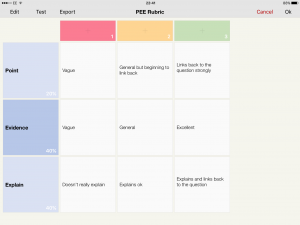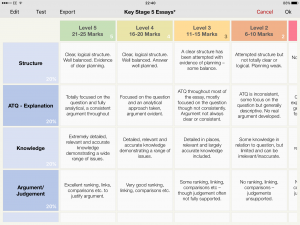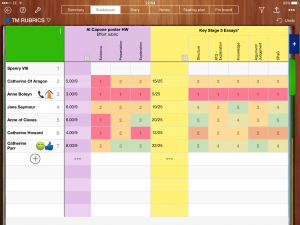It has been two years since:
- I wrote a blog to share my thoughts and experiences
- I attended a conference in person as this weekend (25/09/2021) as I attended the inaugural ResearchEd Nottingham
- I attended the PTE Wonder Years conference on the knowledge rich curriculum
It will probably be no surprise to you when reading this that I sit at the trad end of the teaching spectrum. I believe that the knowledge rich curriculum is a matter of social justice and to predicate the curriculum upon a pedagogical approach i.e. task after task with students wandering through the learning directionless, further compounds the educational inequalities which are already vast in this country. I believe that the knowledge rich curriculum can go some way to closing the gap for every student.
Here I want to say that I have undertaken a long journey building a knowledge rich curriculum in history, which is underpinned by mastery booklets. The booklets include the key knowledge that needs to be learned, workspace in lieu of an exercise book, two assessments embedded per term based on a bespoke assessments questions (out of 10 marks with custom-made mark schemes to make moderation/standardisation easier) which test the knowledge and key historical skills that have been learned rather than a regurgitation of GCSE questions, a five-a-day knowledge check after each topic, and three ten question knowledge checks which are cumulative and interleaved over a term.
This acts as the central resource and the benefits have been plentiful:
- The booklets allow the teacher to focus on teaching. Students respect that we are the experts as this central resource is written by us which is deliberately pitched to the top, having the highest expectations and aspirations for our students (it also saves endless time in terms of printing).
- This approach allows us to innovate the curriculum collaboratively and have meaningful curriculum conversations about changes, which in turn, allows for the development of subject knowledge and provides staff with key opportunities to build the curriculum with me and therefore, there is greater buy in and ownership from my team.
- We support students with Dylan Wiliam’s idea of responsive teaching providing any support needed via high quality teacher talk, probing questioning, and modelling. For example, we often write the answer to the big question together through extensive oral questions to formulate every sentence of our answer.
This approach has taken time – I had a two-year plan and I stuck to it. It started with meeting staff and rationalising both the knowledge rich curriculum, the use of booklets and the structure of the booklets. Following this, we sequenced the curriculum and made decisions on what powerful knowledge to include and more importantly, what not to include. I then delegated different parts of the curriculum to different staff members, starting with KS3 (I was blessed to have four very willing and very able historians working for me at the time when I started this and when I moved school, I had a very able and keen ECT1 who was endlessly committed to this project) so not to overload myself or my team. There was then an editing stage where I acted as a critical friend for my team to ensure consistency of approach. Finally, there is an emphasis on the importance of consistency of the lessons ensuring that they are quality and bespoke for each topic within the booklet, underpinned by big questions, quality teacher talk (which introduces the topic, the big question and key terms), ensuring that the lessons have answers built into them to allow teachers to teach and expertly talk students through answers (again utilising direct instruction), and the use of green pen to close the gap on the comprehension as well as the analysis/evaluation tasks to ensure no student is left behind.
Lessons learned
It is safe to say that as I wandered down the path to a knowledge rich curriculum, I went down a few wrong alleys and took a few wrong turns. I think it is key, as Kat Howard argued aptly at this week’s ResearchEd Nottingham (#rEDNotts), that making mistakes and owning them is key to the development of any teacher. Here, I want to outline some of the mistakes I made and tie in my experiences at key #rEDNotts.
Applying this model to different subjects
In my role as Director of Humanities, I have to wear many hats and manage no less than six subjects (History, Geography, RE, Citizenship, Sociology and PSHE). After some excellent improvements were made in my first term in my current school to the Geography curriculum, it still felt like it was missing a vital piece which I believed to be a central resource like the booklets we have in History. Students were doing little to no reading and for me, this is one of the central planks of what I believe makes a strong humanities curriculum as I want to embed rigorous comprehension and quality teacher led closing the gap time on the comprehension of knowledge. Furthermore, after several sessions to decide on the sequencing and topics for each booklet, I imposed the exact same model from my History booklets on Geography. This was my first mistake. Geography is distinctly different, and the needs of the booklet are different with more diagrams needed in places than text which can be taught via quality teacher talk as clear example. What is more, when turning to the lessons, I made two mistakes. Firstly, I did not explain the lesson formula well enough to a relatively inexperienced Geography team and thus, the lessons became too formulaic which we are going some way to correcting. Secondly, I rarely use videos and now accept in Geography there is a greater need for videos than in History. However, at first I insisted this should be the same in all Humanities subjects and videos were to be used sparingly. In short, I wrongly shackled the Geography department.
However, I am exceptionally lucky to have a team that are developing their own ideas and conversations have taken place on how we can change the booklets and lessons to fit Geography better. Conclusion: do not hastily rush and make sure the curriculum model fits the subject.
Retrieval practice – when to use it and not to use it.
Sam Strickland aptly argued at #rEDNotts that retrieval should not be a straitjacket – it should not be a tick box exercise, if it does not serve a purpose, don’t do it. I believe whole school policies on such things like using retrieval at the start of every lesson rarely achieve what they set out to. This led me to further consider my position on retrieval, as earlier in the week I had spoken to my team about diversifying our retrieval practice across the faculty. Kate Jones (using the work of Bjork and Bjork, 2011) argues that varying the types of tasks, rather than keeping them constant or predictable, improves later retention, even though it makes learning harder in the short term. As a result, we are going to use a more varied diet of retrieval practice and work out what works for our students. We have already embedded retrieval as our homework model, now we need to diversify the types of retrieval in class and how and when we use such tools.
Diversity in the Curriculum
Bennie Kara excellent talk on diversifying the curriculum at #rEDNotts made me realise that whilst my attempts to diversify my curriculum – with the introduction of Mansa Musa, the Black Tudors, the Haitian Revolution, Alan Turing’s role in WW2, the female liberation movement post-WW2, the introduction of the pill and abortion and their effect on the lives women (or lack of) – are not quite hinterland, however, they are not quite core yet either. One of my goals this year is to introduce more women’s and LGBTQ history into my curriculum of history and look to see how we can diversify Geography in the same vein.
Behaviour underpins everything
Kimberly Willmot’s talk at #rEDNotts was exceptional. Her messages were simple, but clearly powerful. Consistent language is key (I really love idea that something as simple as ‘we do not that here at Queen Elizabeth’s’ is consistently used and the students can only reply sorry sir/miss – there is real power in this) and hierarchy in the classroom of novices and experts, where teachers are put on pedestal and are trusted to make decisions on behaviour i.e., when someone needs to be removed from a room for the benefit of the class, was resonating with everything I believe about how we should manage behaviour in any school. In my faculty, I am the authority figure, I deal with all removals and any punishments when asked to enforce them by my team. However, post-Covid lateness is a problem as students re-navigate the school and push the boundaries of what they can and cannot get away with. It is safe to say some of my staff have struggled with this and I wondered to myself why? It was clear, because whilst I had imposed a system where if a student is a minute late, they owe me two minutes of their time and that students need to be in the room before the bell rings (metaphorically – we have no bell system), I had not shared this with staff. This simple, but effective message, has saw some benefits already in my faculty. Now, we have more consistent messages – e.g. students need to be back in the room two mins early from breakfast and lunch so they are ready to learn, that we demand silence when we are speaking as the experts and we use Doug Lemov’s Control the Game technique to ensure all are actively reading are just some of the shared consistent messages and approaches we use. As a Sam Strickland argued aptly #rEDNotts, Students flourish in an environment that is predictable. Simple tweaks go a long way. Moreover, if behaviour isn’t a priority in your school, there is a problem. It is important to look after yourself and work in a supportive environment which expects 100% compliance.
Explicit CPD
In my faculty, we have a weekly teaching tip every department meeting (so far we have looked at Big Questions and how to write them, EAL strategies, and cognitive load). These are delivered by myself and my team as I seek to empower them as much as I can. One thing this weekend, when listening to Kat Howard’s excellent talk at #rEDNotts on professional development, and hearing the overwhelming message of the power of teachers as the expert made me consider – have I taught what my team what direct instruction is properly? Have I modelled this well enough? How can I model this effectively? This is something I aim to work on over the coming weeks as much like Alexander Hamilton, I am never satisfied.
Comment is free.




